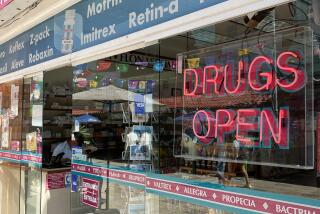Pakistan Medicine Plagued by Deadly Fake Drugs : Asia: Two-thirds of medicines dispensed in government hospitals, up to half of medications sold in rural areas are counterfeit.
- Share via
KARACHI, Pakistan — Potentially deadly counterfeit drugs produced in Karachi’s teeming back streets are threatening Pakistan’s health care system, already beset by poor conditions and a lack of money.
Capsules of “penicillin” made from chalk, metal “pills,” contaminated injections and bottles of vitamin solution containing fungus are prevalent, but they find their way into public health programs.
“The problem is huge,” said Farooq Hadi, director of the pharmaceutical industry’s trade association, the Pharma Bureau of Overseas Investors General. “There are probably more people involved in the production of illegal drugs than legal ones.”
In rural areas, where most people are illiterate, pharmaceutical officials estimate that some 50% of all drugs are counterfeit. Many people recognize a drug by its packaging and are easily deceived into buying fakes.
U.S.-based Wyeth Laboratories’ “Entox P,” for example, is copied as “Wantox B” by a company called Wahid, a name very similar to Wyeth, when spoken in Pakistani. Most pharmacists are either too unskilled to know the difference or are profiting too easily to care.
Victims hampered by poverty and illiteracy often are too ignorant to seek legal redress. Even with a lawyer, they find it difficult to track down the counterfeiter.
“You have to bribe a policeman in order to report a case here,” said Sultan Anwar, manager at Wyeth Laboratories in Karachi. “How should ordinary people complain?”
In urban government hospitals, the paramedics who assist doctors in dispensing drugs produced in back-room operations see the scale of the problem.
“Two-thirds of government hospital drugs are spurious,” said Zakir Hussein, a paramedic in one of Karachi’s provincial government hospitals.
Drugs often are used by public hospitals after their expiration date. Disposable syringes are used up to 20 times, health workers say. In 1989, six people died in Karachi when an entire stock of locally produced plasma drips were found to contain fungus.
Responsibility for the flourishing counterfeiting business is repudiated by government officials, doctors and pharmaceutical producers alike.
The multinational drug companies have taken the brunt of criticism for putting profit before people. Many now believe they should clean up the industry by pursuing the manufacturers of bogus drugs.
Farooq Hadi of the pharmaceutical trade association disagrees.
“We operate in different markets from the spurious manufacturers,” he said. “The poor could not afford our products anyway. So it is not worth our while prosecuting these producers, even if we could find them.”
Drug prices, set by the government, are low enough to squeeze the manufacturers’ profits but still too expensive for most Pakistanis. Bogus manufacturers exploit this gap. With no regulation, no quality control and few overheads, they substantially undercut the higher quality producers.
“Western drug producers cannot monitor the entire market,” said Farooq Hadi. “We are not guardians of law and order or even of health. That is the role of central government.”
The federal government, however, protests that provincial governments actually purchase the drugs. Further, officials say there is no federal money available to search for illicit producers.
The provincial governments say their hands are tied by financial regulations.
“It is the finance department, rather than the health department, that orders drugs for a government hospital,” said Kamil Rajpur, former Additional Health Secretary in southern Sind province. “They will usually order the cheapest drug on the market which will be locally produced.”
Regulation of producers is difficult with only 24 drug inspectors in the entire country, of which only 18 are assigned to the provincial governments. Inspectors’ salaries are so low that corruption is commonplace.
“Every drug inspector is bribed by the spurious manufacturers,” said Dr. Mirza Ali Azhar, a Karachi medical consultant.
The Pakistani patient also faces a shortage of Western drugs through theft from public hospitals. Theft has become so common that the Sind provincial government recently stopped ordering new imported supplies because so many were stolen.
“There are no medicines to be found in the hospitals anymore,” said Zakir Hussein. “All the expensive ones are misdirected and sold off in the chemist shops, leaving only the spurious drugs which can kill you.”
Accusations of official corruption are echoed by support workers in the medical profession.
Chemists near Karachi’s Liaquatabad Hospital tell of doctors who search the markets for the cheapest counterfeit drugs. They claim that the doctors are given funds to buy quality imported drugs but in fact purchase cheaper locally made drugs and keep the difference.
“On paper, for instance, the hospitals purchase the finest quality thread for surgery,” said Zakir Hussein. “In reality, the hospitals’ thread is third rate. It snaps inside the body. But they charge the government for good thread, order poor quality and pocket the rest.”
More to Read
Sign up for Essential California
The most important California stories and recommendations in your inbox every morning.
You may occasionally receive promotional content from the Los Angeles Times.













